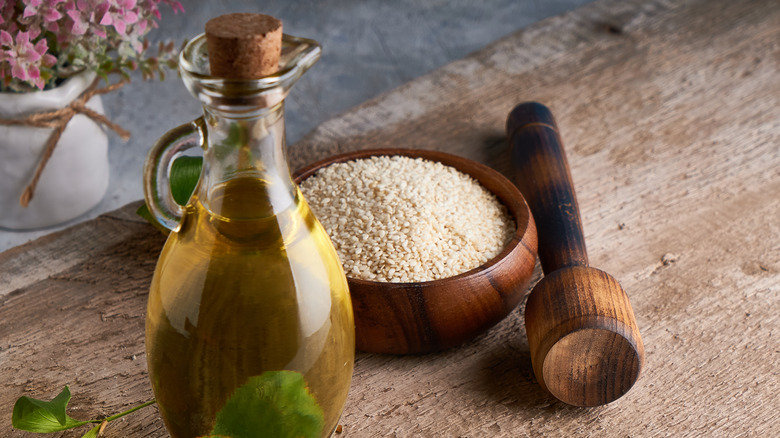The Little-Known Fat That Can Help Lower Your High Blood Pressure
If you have high blood pressure, also known as hypertension, this can increase your risk of several serious health conditions, including heart attack and stroke. However, making changes to your lifestyle, such as eating a heart-healthy diet, exercising, and not smoking can often help bring your blood pressure back down to a healthier range (per Mayo Clinic).
A.D.A.M. (via University of Florida Health) explains that the Dietary Approaches to Stop Hypertension (DASH) diet has proven to be very effective in lowering blood pressure. This eating plan involves eating less sodium and more fruits, vegetables, whole grains, nuts, seeds, and legumes. It also advises eating modest amounts of protein and watching your fat intake. Specifically, it states that you should reduce saturated fat to no more than 6% of calories and total fat to 27% of calories. Of the fats that you do eat, it recommends choosing cooking oils like olive and canola.
Although this oil is not used as frequently in the U.S., the American Heart Association also lists sesame oil as a healthy alternative. Not only can it help reduce levels of artery-clogging cholesterol, but it also contains sesame lignans with antihypertensive properties, per a 2006 study in Yale Journal of Biology and Medicine.
Studies show that sesame oil helps reduce blood pressure
Other studies also support sesame oil's role in reducing blood pressure. In a 2006 pilot study published in the Journal of Medicinal Food, the authors looked at the effect of sesame oil in hypertensive diabetics medicated with atenolol (β-blocker) and glibenclamide (sulfonylurea). They found that when sesame oil was used as the participants' only source of edible oil, it lowered blood pressure beyond what was achieved with just medication. The authors speculated that sesame oils' antihypertensive effect might be due to the lignans found in it — such as sesamin, episesamin, sesamol, and sesamolin — as well as its rich vitamin E content and unsaturated fatty acids.
Additionally, a 2012 study in the Journal of Clinical Hypertension showed that in hypertensive men, sesame oil reduced blood pressure both in the short and long term. They stated that even 35 grams was capable of causing acute effects on blood pressure.
A later 2016 study published in the Journal of Clinical Lipidology further found that combining sesame oil with rice bran oil also lowered blood pressure. Additionally, it improved people's lipids.
Suggestions for cooking with sesame oil
If you'd like to include more sesame oil into your diet and you enjoy foods with an Asian flair, Lee Kum Lee suggests incorporating sesame oil's nutty flavor into marinades, salad dressings, stir-fries, noodles, dips, soups, and fried rice. You can also find inspiration in Indian cuisine since sesame oil has been a cooking staple in India for centuries. Puvi states that sesame oil can be used for stir-frying, sautéing, tempering, and making curries and chutneys.
Sesame oil can be used on its own to provide flavor but it's also great for cooking due to its high smoke point. You can use it to cook at higher temperatures without worrying about it smoking or developing a rancid flavor. Its high smoke point is also beneficial to your health since oils that are heated beyond their smoke point can release carcinogenic compounds (per Critical Reviews in Food Science and Nutrition).



